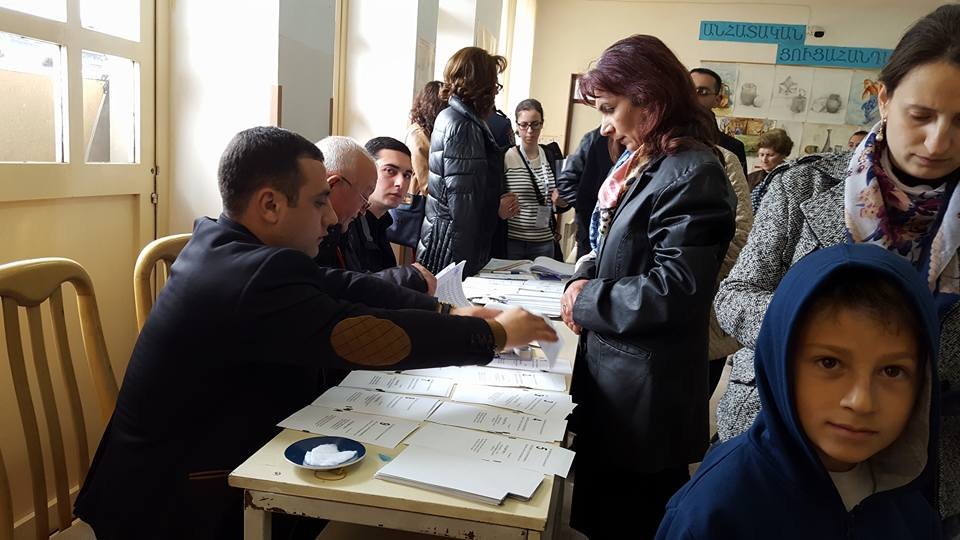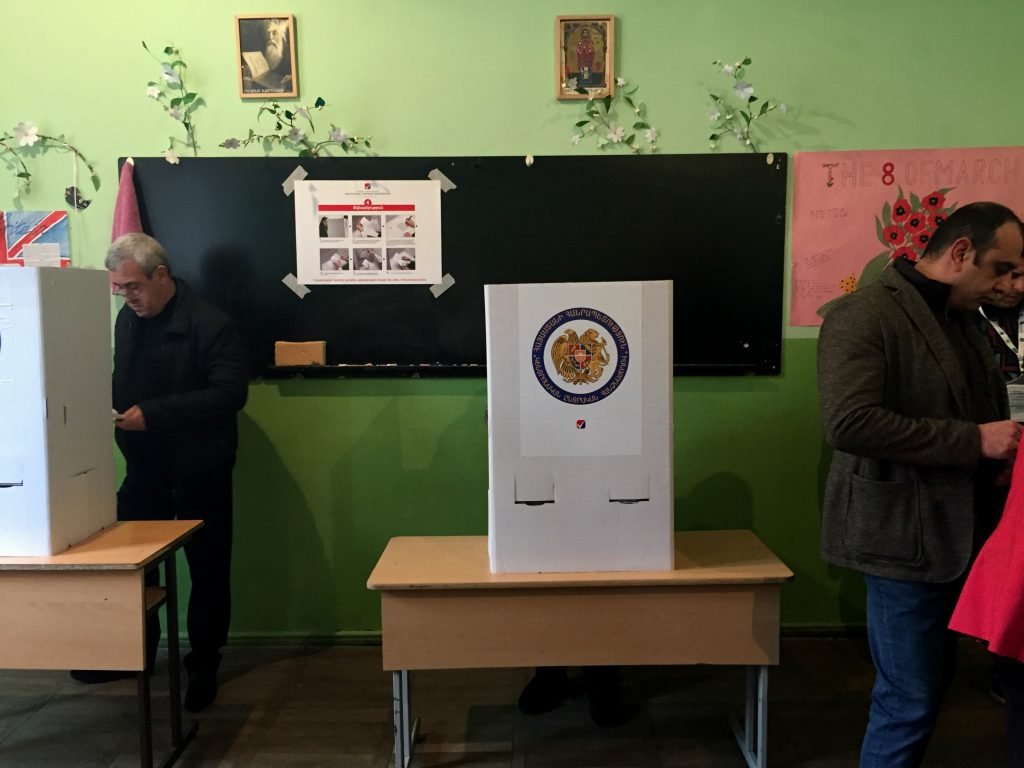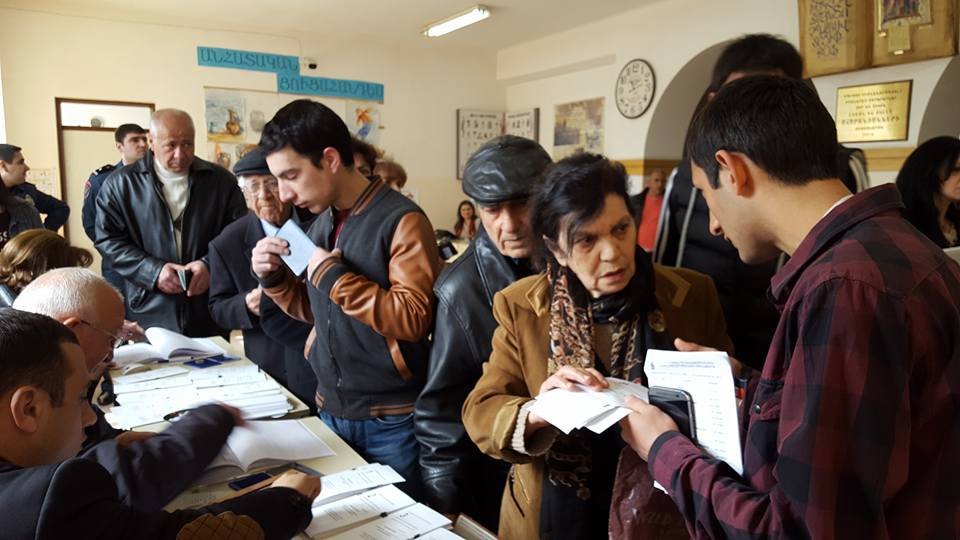Armenian Citizens Vote in 2017 Parliamentary Elections;
RPA, Tsarukyan Bloc, Yelk Bloc, and ARF to Likely Pass Threshold to be Represented in Armenia’s National Assembly
YEREVAN (A.W)—Polls closed at 8 p.m. on April 2, in Armenia’s first Parliamentary Elections since the adoption of its new Constitution in 2015, with 1,574,947 registered voters (60.86 percent) participating. On April 3, at around 12 p.m., the Central Electoral Commission of Armenia (CEC) announced that with around 97 percent of the votes counted, that the ruling Republican Party of Armenia (RPA) had received around 49 percent of the total vote.

One other party—the Armenian Revolutionary Federation (ARF) (6.58 percent)—and two political blocs—the Tsarukyan bloc (27.32 percent) and the Yelk bloc (7.77 percent)—garnered enough votes to pass the threshold to be represented in Armenia’s National Assembly (Parliament).
According to Armenia’s Electoral Code, participating parties require a minimum of 5 percent of the vote, while political blocs require a minimum of 7 percent to be represented.
The five other contenders—the Free Democrats Party (0.94 percent), the Armenian Revival Party (3.71 percent), the Armenian National Congress (ANC)-People’s Party of Armenia (PPA) bloc (1.65 percent), the Communist Party of Armenia (0.75 percent), and the Ohanyan-Raffi-Oskanian bloc (2.7 percent)—are set to fail to pass the thresholds.
An unprecedented 28,000 election observers monitored the election, including about 300 Diaspora Armenians, who partnered with local and international non-government organizations (NGOs).
During the election, biometric machinery was used for the first time, to verify the identities of eligible voters and to register them. Also for the first time, cameras were set up in 1,500 of the 2,009 precincts, to live stream the voting. While these, and other safeguards were put in place for the election, several instances of violations and irregularities, voter-intimidation, and even election-related violence were reported from observers in precincts throughout Armenia.
In one case, an election monitor told the Armenian Weekly about an incident at a polling station in Yerevan’s Arabkir district, in which he was verbally attacked and threatened by the chairperson of the election precinct commission. Another monitor in the Zeitun district said that at least three verbal arguments broke out in the precinct to which she was assigned.
Observers of the Citizen Observer Initiative— a coalition of civic groups that deployed over 3,000 monitors across Armenia—identified about 2,000 violations and irregularities—1,147 of which were registered during the voting process. Meanwhile, observers from the Commonwealth of Independent States (CIS) did not report any violations.

One observer, representing a local NGO and stationed in a precinct in the Zeitun district, told the Armenian Weekly that a voter there had discovered the names of seven unidentified citizens who were registered to vote at his home address. In the same precinct, another voter discovered the name of her deceased mother on the voter list. After the observer inquired with the voter, she said that she had notified the precinct commission about irregularity.
Throughout the day, the Armenian Weekly was also notified about several unknown individuals loitering outside various precincts and observing voters enter and exit polling stations in various Yerevan districts, including Zeitun, Arabkir, Davtashen, and Kentron (downtown) Yerevan. Several instances of more than one person entering the voting booth were also reported.
On the evening of April 2, ARF Supreme Council of Armenia representative and ARF campaign manager Aghvan Vardanyan told reporters that he had appealed to the CEC and the Prosecutor General of Armenia, accusing RPA members of intimidating voters at precincts in the Gegharkunik and Araghatsotn provinces.
Vardanyan provided details about an incident in the town of Chambarak, where a group of RPA supporters tried to force ARF and opposition party/bloc representatives out of some polling stations. Vardanyan also said that a local RPA candidate had incited violence in certain villages in the Aragatsotn province, calling what had occurred a “fairly chaotic situation.”
Earlier on April 2, Sisak Gabrielian, a reporter for RFE/RL’s Armenian service, was physically assaulted by a group of men, said to be affiliated with the ruling RPA. Police in Yerevan confirmed the reports regarding the assault later in the day and announced that they were they are investigating the incident.
“The incident occurred after the journalist, Sisak Gabrielian, noticed that many voters in Yerevan’s Kond neighborhood are visiting a local campaign office of the ruling RPA just before going into a nearby polling station and casting ballots there. Some of them had cash in their hands as they left the office,” read a part of the RFE/RL’s report.
RPA spokesperson and Deputy Speaker of the Parliament Eduard Sharmazanov announced at a late-night news conference that the vote was “democratic, transparent, and competitive.” He also announced that the RPA is ready to extend its cooperation with the ARF, but would not be opposed working other potential coalition partners.

The RPA’s total votes may be enough for the party to form an absolute majority in the new Parliament. According to the Electoral Code, if any participating party or bloc achieves a minimum of 54 percent of the vote, they will be eligible to form government in their own right and their chosen individual will become the Prime Minister of Armenia.
If no party or bloc achieves a minimum of 50 percent +1 of the vote, they will be given an opportunity to negotiate with other parties or blocs to form a Coalition government. A maximum of three parties or blocs can form a Coalition government, and the Coalition government must be formed only by necessity of votes to cross the 54 percent threshold.
Before and during the elections, the RPA leadership repeatedly stated that if the party wins the vote, Prime Minister Karen Karapetian, who was appointed in Sept. 2016, will retain his post at least until President Serge Sarkisian completes his final presidential term in April 2018.


If this is the true choice of the people of Armenia, all we can say is good luck to our elected leaders. We also hope, after all these shenanigans, our leaders will take at heart the real interest of the Armenian people. As such, focus should be directed in reducing poverty, mitigating corruption, finding ways of creating employment to minimize out-migration and the creation of a land where the rule of law is paramount. In the end, the most important issue would be to protect the country through the empowerment and the creation of a strong defense.
Very disappointing.
No real changes to be expected.
The status quo continues.
No improvements to happen.
A sad picture.
World news outlets without exception are reporting voter fraud, irregularities, intimidation, buying of “votes”. What a let down.
Vart Adjemian
The Armenians from the diaspora went to Armnenia to check the elections ,you saw that its the same system of fraud and vote buying ,nothing has changed.You like to do something about it ? When officials come to visit the USA belonging to the RPA ,boycott them,don t go see them ,stop all Telethons for Armenia ,do the Telethons just for Artsakh and the strengthening of the Artsakh army.
If Armenia needs money let the Oligarghs and the RPA give the money they have stolen enough millions from the people.
Indeed, we need to do something in diaspora but the question is what? Unlike the previous elections, I spent a few weeks reading local news websites, watching all the material that opposition or independent observes upload on YouTube and even had the chance to communicate with a few young people in Armenia online and I feel extremely sad. you cannot imagine how much energy and determination youth have in Armenia and how this kind of “elections” destroy this and force them to leave the country. I stopped supporting those telethons long time ago and only donating to non-governmental charities but that is certainly not enough. We need to exert real pressure, I even thought about calling our representatives here in US and encouraging them to initiate resolutions that will punish the oligarchs by freezing their bank accounts in US and Europe. There are many things that we can do, boycotting businesses which are owned by these oligarchs during our trips to Armenia is another option, we can even come up with a black list of all these businesses but this all needs organization. Sadly, our leaders in diaspora are busy shaking Serjiks hand instead of taking any real steps. Another five years means another half million youth leaving the country and thousands of old famished people who will be dragged to polling stations to vote for the beloved party in return for 20 dollars, but will there be any Armenia left by that time?!
I see Uncle Sam’s warriors of doom and gloom at at it again.